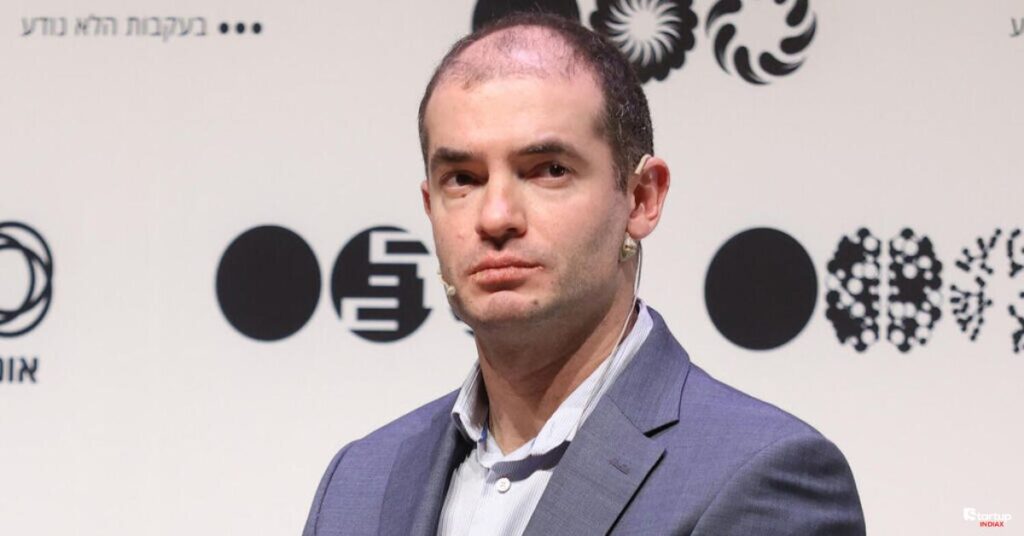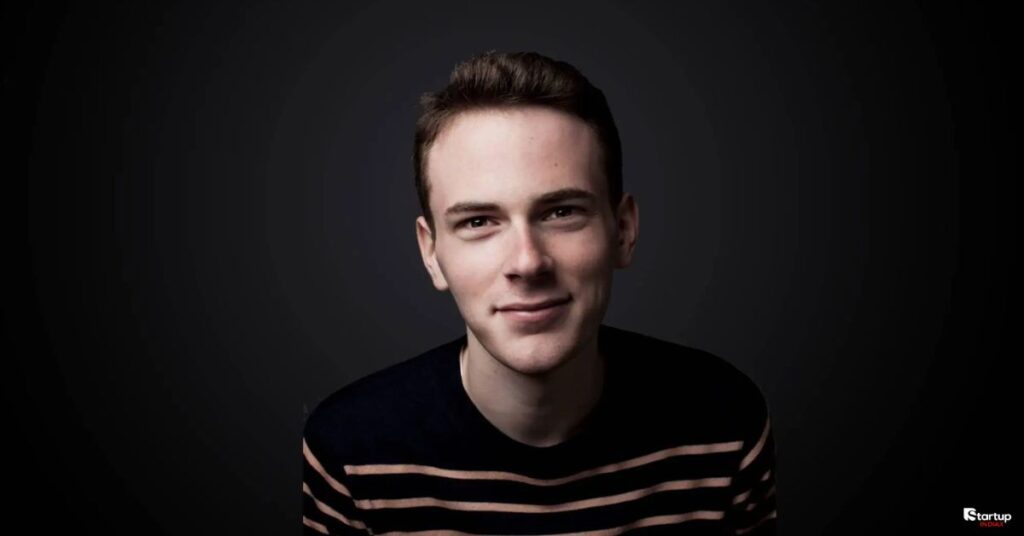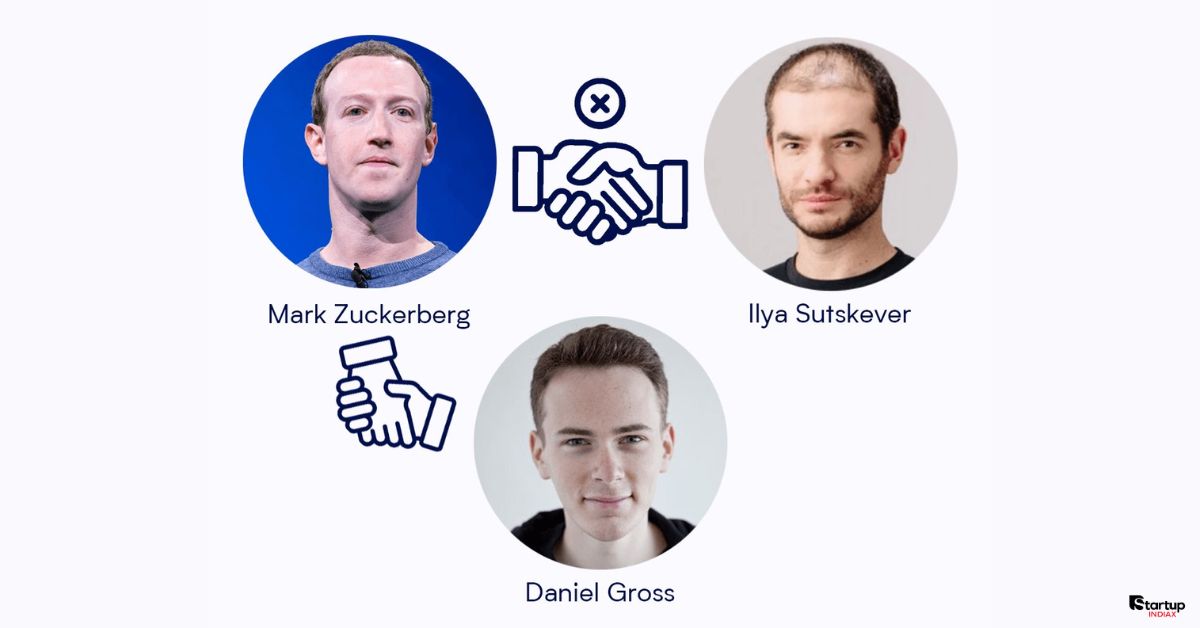Meta Ilya Sutskever acquisition talks have dominated tech headlines this week, as the social media giant’s failed attempt to purchase Safe Superintelligence reveals the intense competition in artificial intelligence. The $32 billion AI company, co-founded by former OpenAI chief scientist Ilya Sutskever, rejected Meta’s buyout offer, forcing Mark Zuckerberg to pivot toward hiring key talent instead. This strategic shift highlights how Meta AI startup acquisition efforts are evolving as the company races to compete with OpenAI and Google in the artificial general intelligence arena.
Startup INDIAX brings you this exclusive analysis of why traditional acquisition models are failing in the AI space, and how tech giants are adapting their talent acquisition strategies to secure competitive advantages in the rapidly evolving artificial intelligence landscape.
Table of Contents
What is Safe Superintelligence and Why Did Meta Want It?
Safe Superintelligence (SSI), newly co-founded by OpenAI’s former chief scientist Ilya Sutskever, has raised $1 billion in cash to help develop safe artificial intelligence systems that far surpass human capabilities. The startup represents one of the most ambitious artificial intelligence ventures in Silicon Valley, focusing exclusively on developing superintelligence before releasing any commercial products.

Meta Ilya Sutskever negotiations began earlier this year when Meta recognized SSI’s unique position in the AI safety research space. Unlike other AI startups rushing to market with consumer products, Safe Superintelligence operates with unprecedented secrecy and long-term vision. By April 2025, a new $2 billion investment that included tech giants Alphabet and Nvidia pushed its valuation to an astounding $32 billion.
The $32 billion AI company attracted Meta’s attention for several strategic reasons:
Advanced AI Safety Research: SSI’s focus on developing safe artificial general intelligence aligns with Meta’s long-term AI ambitions. The startup’s research methodology prioritizes safety over speed, addressing growing concerns about AI alignment and control.
Elite Talent Pool: Beyond Sutskever’s reputation as one of the world’s leading AI researchers, SSI assembled a team of exceptional machine learning scientists and AI safety experts from top institutions and companies.
Competitive Positioning: Acquiring SSI would have positioned Meta ahead of Google, Microsoft, and other tech giants in the race toward artificial general intelligence, providing exclusive access to breakthrough research and development.
Why Did Meta’s Acquisition Attempt Fail?
Meta recently tried to acquire Safe Superintelligence, the AI startup launched by OpenAI co-founder Ilya Sutskever, according to sources familiar with the matter. When Sutskever rebuffed the offer, Mark Zuckerberg moved to recruit the startup’s CEO and co-founder Daniel Gross instead.
The Meta acquisition attempt failed for several interconnected reasons that reflect broader challenges in AI industry consolidation:
Founder Vision Alignment: Sutskever’s commitment to AI safety research conflicted with Meta’s commercial timelines and product development cycles. The OpenAI co-founder prioritizes long-term safety research over immediate commercial applications, creating fundamental misalignment with Meta’s business objectives.
Valuation Disagreements: At $32 billion, Safe Superintelligence commands premium pricing that may have exceeded Meta’s acquisition budget, especially considering the startup’s pre-revenue status and research-focused approach.
Regulatory Concerns: Large tech acquisitions face increasing scrutiny from antitrust regulators worldwide. Meta’s previous acquisition challenges with Instagram and WhatsApp likely influenced both parties’ willingness to pursue a complex deal structure.
Team Independence: Many AI researchers value academic freedom and research autonomy. Integration into Meta’s corporate structure could potentially limit SSI’s innovative research culture and long-term vision execution.
Competitive Dynamics: Sutskever likely recognized that maintaining independence provides more strategic flexibility, including potential partnerships with multiple tech giants rather than exclusive alignment with Meta.
As Startup INDIAX has reported extensively, AI startup acquisitions in 2025 face unique challenges compared to traditional tech buyouts, requiring new approaches to talent acquisition and partnership development.
Who is Daniel Gross and Why is Meta Hiring Him Instead?
Daniel Gross Meta hiring represents a strategic pivot from acquisition to talent recruitment. In June 2024, he co-founded Safe Superintelligence Inc. Time 100 has listed Gross as one of the “Most Influential People in AI”, highlighting his significance in the artificial intelligence ecosystem.

Gross brings exceptional credentials to Meta’s AI development efforts:
Entrepreneurial Success: Before co-founding SSI, Gross built and sold multiple startups, demonstrating both technical expertise and business acumen essential for scaling AI initiatives.
Investment Expertise: Meta is also reportedly taking a stake in Friedman and Gross’ joint venture firm, NFDG, which has invested in prominent AI startups such as Perplexity and Character.AI. This provides Meta indirect access to cutting-edge AI innovations across the startup ecosystem.
Technical Leadership: As SSI’s CEO and co-founder, Gross gained intimate knowledge of advanced AI safety research and superintelligence development methodologies.
Industry Networks: His connections throughout Silicon Valley’s AI community could accelerate Meta’s talent recruitment and partnership development efforts.
Meta has poached the CEO of AI startup Safe Superintelligence, Daniel Gross. Meta is taking a stake in Gross’s venture capital firm, NFDG. In exchange, Gross and his venture capital partner, Nat Friedman, will join Meta as part of the company’s expanded AI leadership team.
This Meta hiring AI talent strategy reflects a broader industry trend where tech giants compete for individual experts rather than acquiring entire companies, providing greater flexibility and reduced regulatory complexity.
What Does This Mean for the AI Industry?
The Meta Ilya Sutskever acquisition failure signals significant shifts in artificial intelligence industry dynamics and competitive strategies. Traditional corporate development approaches may prove inadequate for the unique challenges of AI startup integration.
Talent-First Strategies: Tech giants increasingly prioritize individual talent acquisition over company buyouts. This approach provides greater flexibility while avoiding regulatory scrutiny and valuation challenges associated with large acquisitions.
Research Independence: AI researchers value autonomy and long-term vision alignment over immediate financial returns. Companies like Safe Superintelligence can maintain research focus while partnering selectively with industry leaders.
Valuation Inflation: AI startup valuation metrics have reached unprecedented levels, with pre-revenue companies commanding multi-billion dollar valuations based on potential rather than proven business models.
Safety vs. Speed Trade-offs: The industry faces growing tension between rapid commercialization and responsible AI development. SSI’s research-first approach may influence how other startups balance safety considerations with market pressures.
Partnership Evolution: Rather than exclusive acquisitions, AI companies increasingly pursue strategic partnerships that preserve independence while enabling resource sharing and collaborative development.
Startup INDIAX analysis suggests these trends will accelerate throughout 2025, fundamentally reshaping how AI innovation develops and scales across the technology sector.
How Are Tech Giants Competing for AI Talent?
The competition for artificial intelligence expertise has evolved into a sophisticated talent war involving multiple acquisition strategies and unprecedented compensation packages. Meta AI startup acquisition efforts represent just one approach in this intensely competitive landscape.
Recruitment Strategies:
- Executive Poaching: Direct hiring of startup founders and C-level executives
- Team Acquisitions: Acquiring entire research teams while leaving parent companies intact
- Advisory Relationships: Formal advisory positions that provide influence without exclusivity
- Investment Stakes: Taking equity positions in startups to maintain ongoing relationships
Compensation Innovation:
- Equity Packages: Multi-million dollar stock options tied to AI project success
- Research Budgets: Dedicated funding for exploratory AI research projects
- Publication Rights: Academic freedom to publish research findings
- Team Building: Authority to hire additional researchers and engineers
Meta’s Comprehensive Approach: The company hired Scale AI CEO, Alexandr Wang, to work with Meta and lead its new superintelligence unit. Friedman is part of Meta’s Advisory Group, an external advisory council established by the company to provide guidance on technology and product development.
This multi-pronged strategy allows Meta to access diverse AI expertise while maintaining flexibility in project development and resource allocation.
Industry Impact: The tech giants AI talent competition drives innovation while creating challenges for smaller companies and research institutions. Salary inflation and resource concentration may limit AI development diversity, potentially slowing overall industry progress.
What’s Next for Meta’s AI Strategy?
Meta AI strategy evolution following the failed Safe Superintelligence acquisition reveals the company’s commitment to artificial intelligence leadership despite setbacks. Mark Zuckerberg’s pivot toward talent acquisition and strategic partnerships demonstrates adaptability in rapidly changing competitive dynamics.
Immediate Priorities:
- Team Integration: Successfully incorporating Daniel Gross, Nat Friedman, and other new hires into existing AI development workflows
- Product Development: Accelerating consumer AI product launches to compete with OpenAI and Google
- Research Investment: Expanding fundamental AI research capabilities through both internal development and external partnerships
Long-term Vision: Meta’s artificial general intelligence ambitions remain intact despite the SSI acquisition failure. The company continues investing heavily in AI infrastructure, research facilities, and talent development programs designed to establish long-term competitive advantages.
Partnership Strategy: Rather than pursuing expensive acquisitions, Meta may focus on strategic partnerships that provide access to cutting-edge research while preserving startup independence and innovation culture.
Regulatory Adaptation: Future AI investments will likely prioritize structures that minimize antitrust concerns while maximizing strategic value and competitive positioning.
As Startup INDIAX continues monitoring these developments, Meta’s AI strategy adaptation provides valuable insights for other tech companies navigating similar competitive challenges in the artificial intelligence ecosystem.
Conclusion
The Meta Ilya Sutskever acquisition saga illustrates how artificial intelligence industry dynamics are reshaping traditional corporate development strategies. While Meta couldn’t purchase Safe Superintelligence’s $32 billion valuation, the company’s pivot toward talent acquisition demonstrates strategic adaptability in highly competitive markets.
Key Takeaways:
- AI startup valuations have reached unprecedented levels, challenging traditional acquisition models
- Talent-first strategies may prove more effective than company buyouts in the AI sector
- Research independence increasingly influences founder decision-making in AI ventures
- Tech giants must balance speed and safety considerations in AI development initiatives
The Daniel Gross Meta hiring success suggests that individual talent acquisition may become the dominant strategy for accessing AI innovation and expertise. As the artificial intelligence industry continues evolving, companies that adapt their corporate development approaches will likely achieve better outcomes than those relying on traditional acquisition methods.
What do you think about Meta’s shift from acquisition to talent poaching? Share your thoughts on how this trend might impact AI innovation and startup culture. For more insights into AI industry developments and startup trends, explore Startup INDIAX’s comprehensive coverage of technology sector evolution.
Frequently Asked Questions
Q: Why did Safe Superintelligence reject Meta’s acquisition offer? A: Ilya Sutskever prioritized research independence and AI safety focus over immediate financial returns. The startup’s long-term vision for superintelligence development conflicted with Meta’s commercial timelines and integration requirements.
Q: How much is Safe Superintelligence worth in 2025? A: Safe Superintelligence reached a $32 billion valuation in April 2025 following a $2 billion funding round that included investments from Alphabet and Nvidia, making it one of the most valuable AI startups globally.
Q: Who is Daniel Gross and what role will he play at Meta? A: Daniel Gross is the co-founder and CEO of Safe Superintelligence, named one of Time’s “Most Influential People in AI.” At Meta, he’ll focus on AI product development while Meta takes a stake in his venture capital firm NFDG.
Q: What does this mean for the AI startup ecosystem? A: The failed acquisition highlights how AI talent increasingly values research autonomy over traditional buyout structures. This trend may encourage more AI experts to maintain startup independence while pursuing strategic partnerships.
Q: How is Meta competing with OpenAI and Google in AI development? A: Meta is hiring top AI talent like Daniel Gross and Alexandr Wang, investing heavily in AI research infrastructure, and developing consumer AI products to compete directly with ChatGPT and Google’s AI offerings.

